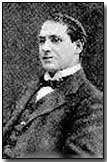Prose & Poetry - Thomas Kettle
 Thomas Michael Kettle
(1880-1916), the Irish nationalist poet, politician and soldier, was born in
Co. Dublin the son of one of the founders of the Land-League, Andrew Kettle.
Thomas Michael Kettle
(1880-1916), the Irish nationalist poet, politician and soldier, was born in
Co. Dublin the son of one of the founders of the Land-League, Andrew Kettle.
Following an education at North Richmond Street Christian Brothers' School, Clangowes Wood College and University College Dublin (UCD) Kettle was called to the bar in 1905. For the next three years he practiced law until he received an appointment in 1908 at UCD as its first Professor of National Economics. It was during this period that Kettle's nascent nationalist views flowered. For a brief period during 1905 he edited The Nationalist.
Two years preceding his UCD appointment Kettle stood for and was elected as M.P. for East Tyrone, on 25 August 1906. His election was close, his margin of victory a slim 16 votes. Kettle was to subsequently embark upon a tour of the U.S.A. representing the Irish Party. In spite of securing re-election in 1910 with an increased parliamentary majority he resigned his seat the same year in order to commit himself full-time at UCD.
In 1913 Kettle joined the Irish Volunteers. One month prior to the outbreak of war in Europe, in July 1914, Kettle was despatched to Belgium in order to procure arms for the Irish nationalist cause. The onset of the First World War nevertheless brought with it an abrupt change of mind.
He became convinced that Britain's support of Belgium - a small country - would harbinger subsequent support for Irish Home Rule - already committed to by the government in London, albeit delayed in its implementation by the arrival of war.
Consequently Kettle returned to Dublin from Belgium and secured a commission with the Dublin Fusiliers in November 1914 - the so-called 'Army of Freedom' - and spoke at some 200 recruitment meetings in Ireland to encourage enlistment with the British Army.
The Easter Rising of 1916 caught Kettle unawares. Its outbreak and violent aftermath depressed him greatly. He also quickly came to realise that while the Irish patriots executed by the British government would later be viewed as heroes (including his brother-in-law Frank Sheehy-Skeffington), Irishmen such as himself serving with the British Army would merely be viewed at best as naive fools. Kettle's ideal of a free united Ireland in a free Europe was extinguished.
He consequently requested that he be sent to fight in France in the Somme Offensive. It was during the Somme battle that he met his death during an attack upon Givenchy on 9 September 1916. His body was never recovered. A memorial to Kettle by Francis W. Doyle-Jones stands in St. Stephen's Green in Dublin. It quotes lines from a sonnet he penned to his daughter shortly before his death ('To My Daughter Betty'):
Know that we fools, now with the foolish dead,
Died not for the flag, nor King, nor Emperor,
But for a dream, born in a herdsman's shed,
And for the secret Scripture of the poor.
Kettle's war journalism was posthumously published in collected form as The Ways of War (1917).
An "incendiary shell" is an artillery shell packed with highly flammable material, such as magnesium and phosphorous, intended to start and spread fire when detonated.
- Did you know?
